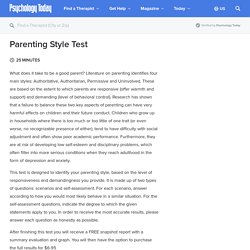

What is a parenting style? The psychology and theory behind the 4 Parenting Styles. American College of Pediatricians.
Authoritarian Parenting (Tough Love Parenting) - ParentingForBrain. What Is Permissive Parenting? - Experts Explain Permissive Parenting. Characteristics and Effects of Uninvolved Parenting. Uninvolved parenting, sometimes referred to as neglectful parenting, is a style characterized by a lack of responsiveness to a child's needs.
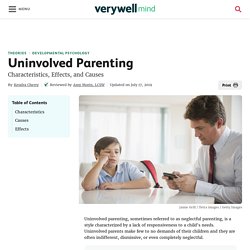
Uninvolved parents make few to no demands of their children and they are often indifferent, dismissive, or even completely neglectful. The Major Parenting Styles During the 1960s, psychologist Diana Baumrind described three different parenting styles based on her research with preschool-age children: authoritarian, authoritative, and permissive parenting. In later years, researchers added a fourth style known as uninvolved parenting. So what does the uninvolved parenting style look like at a glance? Some uninvolved parents may be relatively hands-off with their kids, but may still have some basic limits such as curfews. Justifying the importance of parenting styles: Supportive parents are associated with safer teenage driving. Am Fam Physician. 2009 Dec 15;80(12):1486-1491.
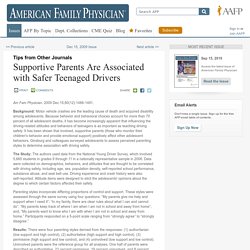
Background: Motor vehicle crashes are the leading cause of death and acquired disability among adolescents. Because behavior and behavioral choices account for more than 70 percent of all adolescent deaths, it has become increasingly apparent that influencing the driving-related attitudes and behaviors of teenagers is as important as teaching driving safety. It has been shown that involved, supportive parents (those who monitor their children's behavior and provide emotional support) positively affect other adolescent behaviors. Ginsburg and colleagues surveyed adolescents to assess perceived parenting styles to determine association with driving safety.
The Study: The authors used data from the National Young Driver Survey, which involved 5,665 students in grades 9 through 11 in a nationally representative sample in 2006. Effects of Authoritative Versus Authoritarian Parenting Style. In response to the indictment last week of NFL player Adrian Peterson for child abuse, essayist Michael Eric Dyson wrote a thoughtful piece about the roots of corporal punishment within the American Black community.
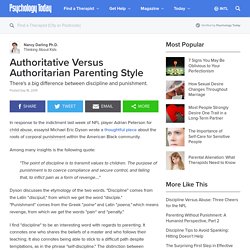
Among many insights is the following quote: article continues after advertisement. Striking a balance. Parenting Style Of Singaporean Parents - Watch The Video. Smaller families in Singapore, leading to unhealthy parenting styles. SINGAPORE: It really didn’t seem that long ago when the Stop at Two campaign was in full swing, warning parents in Singapore that “the more you have, the less they (each) get”.
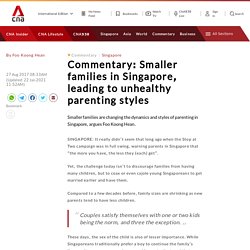
Yet, the challenge today isn’t to discourage families from having many children, but to coax or even cajole young Singaporeans to get married earlier and have them. Compared to a few decades before, family sizes are shrinking as new parents tend to have less children. Couples satisfy themselves with one or two kids being the norm, and three the exception. These days, the sex of the child is also of lesser importance. While Singaporeans traditionally prefer a boy to continue the family’s lineage, it seems more couples are waking up to the trend that daughters make more caring, homely and reliable caregivers in their old age. Family dynamics are also shifting, as families get smaller. Many Singaporeans’ parenting style not helping children succeed - TODAYonline.
I was disturbed to read the report “MP proposes piloting cluster of schools without exams, streaming” (Jan 22).
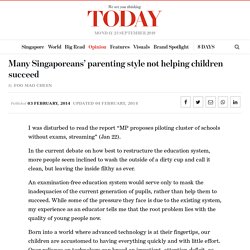
In the current debate on how best to restructure the education system, more people seem inclined to wash the outside of a dirty cup and call it clean, but leaving the inside filthy as ever. An examination-free education system would serve only to mask the inadequacies of the current generation of pupils, rather than help them to succeed. While some of the pressure they face is due to the existing system, my experience as an educator tells me that the root problem lies with the quality of young people now. Tiger mums, helicopter parents and modern child-rearing angst, Opinion News. Growing up in the 1960s and 70s, I had what could be accurately called a carefree childhood.
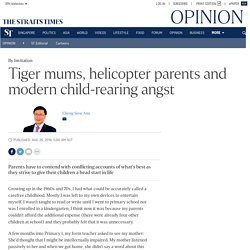
Mostly I was left to my own devices to entertain myself. I wasn't taught to read or write until I went to primary school nor was I enrolled in a kindergarten; I think now it was because my parents couldn't afford the additional expense (there were already four other children at school) and they probably felt that it was unnecessary. A few months into Primary 1, my form teacher asked to see my mother: She'd thought that I might be intellectually impaired. My mother listened passively to her and when we got home, she didn't say a word about this to me then and never after. My mother, who had a few years of formal education and could read and write only in Chinese, proceeded to coach me on that single subject and kept an eye out that I would complete whatever homework I was given - even though she couldn't understand most of the other subjects. There have been many calls for changes. Understanding parenting styles in a localised context.
Parenting Styles and their Effects. Effective Parenting Skills. Can you identify the different parenting styles? Parenting Style Quiz. What does it take to be a good parent?
